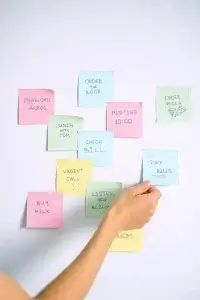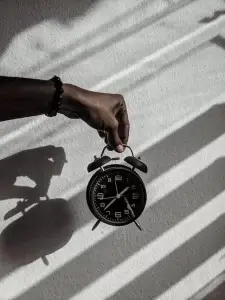It’s easy to get distracted, but it’s also easy to stay focused. If you know how to manage your time, you can accomplish any goal. Here are some tips for staying organized and getting things done:
Define your goals clearly.
To stop procrastination, you’ll first have to define your goals clearly. If you don’t know what you want, how can you possibly achieve it?
Write down a list of all the things that need to be done and make a note of the deadlines for each task. This will help keep everything organized in one place so there are no excuses for forgetting anything. The key thing here is not only setting a deadline but also rewarding yourself if it’s met on time—and this could be as simple as buying yourself some chocolate!
Block distractions.

The first step to becoming a productive person is to block out distractions. For example, don’t play games on your phone or watch TV while trying to work. It may seem like there’s nothing wrong with a quick game of Candy Crush in the morning, but if you’re playing while you should be working, then your productivity will suffer. When you’re done with whatever project you need to complete, take some time off from technology and allow yourself some R&R in order for your brain to recharge before starting another task.*
For example: “I’m going to work on this project today”* = good!*
“When I’m done with this project, I’ll reward myself by watching Netflix.” = bad!
Start small, then work your way up.
One of the main reasons we procrastinate is because we think that completing a big project will bring us satisfaction and relief. But when you’re starting out, it’s easier to take on smaller tasks. For example, if you have a long-term goal of becoming more organized at work, start by organizing your desk or getting rid of clutter in one room at home. After that, maybe try reorganizing your entire house or handling email for just 10 minutes per day for one week straight—and reward yourself with something fun when you do it!
Set a time limit for yourself.

A lot of people procrastinate because they don’t have a good sense of how long something should take. They say things like, “I’ll get this done in a week,” when they know it will take them a month.
Instead, try setting time limits for yourself. For example, if you’re working on an essay and want to finish it by Wednesday night—and can do it more quickly if you put in more hours today—then set your deadline as Tuesday afternoon at 4 p.m., and get started on the project immediately!
It’s also important not to overload yourself with too many tasks at once, especially if there’s no way that all those projects will be completed by their respective deadlines! If possible, try limiting your workload for each day so that nothing slips through the cracks and everything gets done on time; otherwise (and especially if there are lots of deadlines), then make sure each task has its own deadline without overlapping into other tasks’ deadlines or making them run over into each other’s territory (e.g., “I’m going out tonight.” versus “I need this essay finished by two hours from now”).
Make a list of all the steps you need to accomplish your goal.
The first step in reducing procrastination is to break down your big tasks into smaller steps. Write down the steps you need to accomplish your goal, and start with the first one. For example, if you want to clean up your room, write down:
- Pick up clothes off floor
- Put dirty clothes in laundry hamper
- Get vacuum cleaner out of closet
Reward yourself for meeting short deadlines.
Rewarding yourself is one of the best ways to keep yourself on task. When you accomplish a small part of what needs to be done, reward yourself! It can be something as simple as taking a break from your work and going for a walk or calling up a friend to chat. Don’t use food or drink as a reward because this will often lead to overindulging. Instead, reward yourself with something that will make you feel accomplished and proud of your accomplishments—like getting a new book on Amazon or buying tickets for someplace exciting! Remember not to reward yourself too often; otherwise, it won’t be special anymore!
You can do anything if you break it down into small, doable steps.

If you want to get something done, but can’t make yourself do it, try breaking down the task into small pieces. It’s easy to think of a project as one big thing that needs completion; however, if you break it down into smaller steps and tackle them one at a time, it’s easier to get started on any project.
For example, let’s say you want to clean out your garage. First decide what kind of shape or condition in which you want the garage: organized? Or messy? Then decide what tools are needed for each part: do I need a vacuum cleaner for this corner? Or an old broomstick for those cobwebs over there? You don’t have to think about those things all at once—just start with one step at a time! You can always come back later if something else needs changing after completing another step first (or maybe even going back multiple times before actually finishing).
Conclusion
I hope the tips I’ve given you will help you get started on organizing your time. Remember, this is a process and it takes time to change your habits. But with these steps, I know that anyone can be successful!

